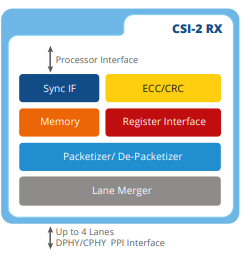Description
The MIPI Camera Serial Interface 2 (CSI-2) is an interface between a Camera and a host processor baseband application engine. This interface is defined by MIPI Alliance, which defines a series of modules in a MIPI compliant product. This MIPI CSI-2 Receiver is used in mobile and high–speed serial applications as a controller for receiving camera video and transmitting camera commands from/to MIPI CSI-2 Transmitter over MIPI lines. The camera data is encoded and then transmitted. The MIPI CSI-2 Transmitter along with our MIPI CSI-2 Receiver and MIPI DPHY provides a complete solution for decoding MIPI CSI-2 data.

Features
-
Compliant with MIPI CSI-2 Specification v1.3
-
Complaint with MIPI DPHY V1.2
-
Compliant with MIPI CPHY V1.1
-
Lane configuration: CSI2_ RX: Programmable 1, 2, or 4 Data Lane Configuration.
-
Operate in continuous and non-continuous clock modes.
-
Supported YUV Data Types : YUV420_8bit, YUV420_10bit, YUV422_8Bit, YUV422_10bit, YUV420_8Bit_CSPS, YUV420_10bit_CSPS, LEGACY YUV420_8bit
-
Supported RGB Data Types: RGB888, RGB565, RGB666, RGB555, and RGB444.
-
Supported RAW Data Types: RAW6, RAW7, RAW8, RAW10, RAW12, and RAW14.
-
Supports User defined data types.
-
Pixel Interface: 64 bit Pixel data alignment
-
Data Rate: CSI-2 DPHY : Up to 1.5 Gbps per lane
-
Selectable Register configurations through Generic Parallel interface.
Deliverables
-
Configurable RTL Code
-
HDL-based test bench and behavioral models
-
Test cases
-
Protocol checkers, bus watchers, and performance monitors
-
Configurable synthesis shell
-
Documentation
-
Design guide
-
Verification guide
-
Synthesis guide
Benefits
-
Data lane count
-
Color modes
-
Pixel interface width
-
Application interface –Pixel or AXI
-
Command FIFO depth
-
Highly modular and configurable design
-
Layered architecture
-
Active low async reset
-
Clearly demarcated clock domains
-
Extensive clock gating support
Applications
-
Mobile
-
IOT
-
Automotive
-
Wearables
![]()